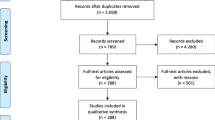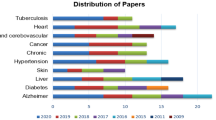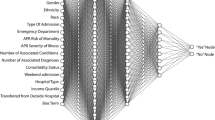Abstract
Introduction
Artificial intelligence (AI) has greatly transformed healthcare in developed countries. However, there is limited data describing the extent of AI adoption in African healthcare systems. The aim of this study was to understand the state of AI healthcare research in Africa.
Methods
A scientometric analysis was conducted to visualize the state-of-the-art research of AI in healthcare in Africa.
Results
Twenty-six relevant articles, published by 178 authors and affiliated with 96 organizations in 31 countries, were included. The most prolific African countries were South Africa, followed by Nigeria and Ghana. Some articles were published by authors affiliated with non-African countries. None of the contributing authors published more than 2 articles. Only 20 (11.2%) authors collaborated, forming a single cluster. The most common AI tools used in African health systems were deep learning neural networks applied in medical imaging, Adaptive Neuro-Fuzzy Inference Systems, and E-algorithms.
Conclusion
Our results suggest that AI for healthcare in Africa is still in its developmental phase with limited published research. Our social network analysis highlighted a South and West African predominance in the research relational network of AI in healthcare. This discrepancy presents an opportunity for coordination and increased collaboration with healthcare institutions advanced in the use of AI within Africa and beyond.





Similar content being viewed by others
References
Davenport T, Kalakota R. The potential for artificial intelligence in healthcare. Future Healthc J. 2019;6:94–8.
Owoyemi A, Owoyemi J, Osiyemi A, Boyd A. Artificial Intelligence for Healthcare in Africa. Front Digit Health. 2020;2:6.
Njei B, Kanmounye US, Seto N, McCarty TR, Mohan BP, Fozo L, Navaneethan U. Artificial intelligence in medical imaging for cholangiocarcinoma diagnosis: A systematic review with scientometric analysis. J Gastroenterol Hepatol. 2023.
Mathew PS, Pillai AS. Boosting traditional healthcare-analytics with deep learning AI: Techniques, frameworks and challenges. 2021. p. 335–65.
Akanbi MO, Ocheke AN, Agaba PA, Daniyam CA, Agaba EI, Okeke EN, et al. Use of electronic health records in sub-Saharan Africa: Progress and challenges. J Med Trop. 2012;14:1.
Tran BX, Vu GT, Ha GH, Vuong QH, Ho MT, Vuong TT, La VP, Ho MT, Nghiem KC, Nguyen HL, Latkin CA. Global evolution of research in artificial intelligence in health and medicine: a bibliometric study. J Clin Med. 2019 Mar 14;8(3):360.
Naidoo S, Bottomley D, Naidoo M, Donnelly D, Thaldar DW. Artificial intelligence in healthcare: Proposals for policy development in South Africa. S Afr J Bioeth Law. 2022;15:11–6.
van Stam G. Conceptualization and practices in digital health: voices from Africa. Afr Health Sci. 2022;22:664–72.
Guo J, Li B. The application of medical artificial intelligence technology in rural Areas of developing countries. Health Equity. 2018;2:174–81.
Eze P, Lawani LO, Agu UJ, Acharya Y. Catastrophic health expenditure in sub-Saharan Africa: systematic review and meta-analysis. Bull World Health Organ. 2022;100:337–351J.
Soliz P, Zamora G, Aslan J, Nemeth SC, Benson J, Burgess P. Impact of artificial intelligence for diabetic retinopathy screening in a Malawi, Africa clinic. Invest Ophthalmol Vis Sci. 2020;61:476.
Adeoye J, Akinshipo A, Thomson P, Su YX. Artificial intelligence-based prediction for cancer-related outcomes in Africa: Status and potential refinements. J Glob Health. 2022;12:3017.
Lukyanenko R, Maass W, Storey VC. Trust in artificial intelligence: From a Foundational Trust Framework to emerging research opportunities. Electron Mark. 2022;32:1993–2020.
Moyo S, Doan TN, Yun JA, Tshuma N. Application of machine learning models in predicting length of stay among healthcare workers in underserved communities in South Africa. Hum Resour Health. 2018;16:68.
Antwi WK, Akudjedu TN, Botwe BO. Artificial intelligence in medical imaging practice in Africa: a qualitative content analysis study of radiographers’ perspectives. Insights Imaging. 2021;12:80.
Young C, Barker S, Ehrlich R, Kistnasamy B, Yassi A. Computer-aided detection for tuberculosis and silicosis in chest radiographs of gold miners of South Africa. Int J Tuberc Lung Dis. 2020;24:444–51.
Ghaleb H, Alhajlah HH, Bin Abdullah AA, Kassem MA, Al-Sharafi MA. A scientometric analysis and systematic literature review for construction project complexity. Buildings. 2022;12:482.
Mingers J, Leydesdorff L. A review of theory and practice in scientometrics. Eur J Oper Res. 2015;246:1–19.
van Eck NJ, Waltman L. Citation-based clustering of publications using CitNetExplorer and VOSviewer. Scientometrics. 2017;111:1053–70.
Stokes K, Oronti B, Cappuccio FP, Pecchia L. Use of technology to prevent, detect, manage and control hypertension in sub-Saharan Africa: a systematic review. BMJ Open. 2022;12:e058840–e058840.
Mellado B, Wu J, Kong JD, Bragazzi NL, Asgary A, Kawonga M, et al. Leveraging artificial intelligence and big data to optimize COVID-19 clinical public health and vaccination roll-out strategies in Africa. Int J Environ Res Public Health. 2021;18:7890.
Abegaz KH, Etikan İ. Artificial intelligence-driven ensemble model for predicting mortality due to COVID-19 in East Africa. Diagnostics (Basel, Switzerland). 2022;12:2861.
Lamanna C. Task-sharing with artificial intelligence: a design hypothesis for an Emergency Unit in sub-Saharan Africa. Pan Afr Med J. 2021;38:387.
Taha-Mehlitz S, Hendie A, Taha A. The development of electronic health and artificial intelligence in surgery after the SARS-CoV-2 pandemic-a scoping review. J Clin Med. 2021;10:4789.
Singh JA. Artificial intelligence and global health: opportunities and challenges. Emerg Top Life Sci. 2019;3:741–6.
Thomford NE, Bope CD, Agamah FE, Dzobo K, Owusu Ateko R, Chimusa E, et al. Implementing artificial intelligence and digital health in resource-limited settings? Top 10 lessons we learned in congenital heart defects and cardiology. OMICS J Integr Biol. 2020;24:264–77.
Botwe BO, Akudjedu TN, Antwi WK, Rockson P, Mkoloma SS, Balogun EO, et al. The integration of artificial intelligence in medical imaging practice: Perspectives of African radiographers. Radiography. 2021;27:861–6.
Dzobo K, Adotey S, Thomford NE, Dzobo W. Integrating artificial and human intelligence: A partnership for responsible innovation in biomedical engineering and medicine. OMICS J Integr Biol. 2020;24:247–63.
Greis C, Maul LV, Hsu C, Djamei V, Schmid-Grendelmeier P, Navarini AA. Artificial intelligence to support telemedicine in Africa. Hautarzt. 2020;71:686–90.
Mathenge WC. Artificial intelligence for diabetic retinopathy screening in Africa. Lancet Digit Health. 2019;1:e6–7.
Mumuni AN, Hasford F, Udeme NI, Dada MO, Awojoyogbe BO. A SWOT analysis of artificial intelligence in diagnostic imaging in the developing world: making a case for a paradigm shift. Phys Sci Rev. 2022 Oct 21(0).
Waljee AK, Weinheimer-Haus EM, Abubakar A, Ngugi AK, Siwo GH, Kwakye G, et al. Artificial intelligence and machine learning for early detection and diagnosis of colorectal cancer in sub-Saharan Africa. Gut. 2022;71:1259–65.
Townsend BA. Software as a medical device: critical rights issues regarding artificial intelligence software-based health technologies in South Africa. J S Afr Law/Tydskrif vir die Suid-Afrikaanse Reg. 2020;2020:747–62.
Bellemo V, Lim ZW, Lim G, Nguyen QD, Xie Y, Yip MYT, et al. Artificial intelligence using deep learning to screen for referable and vision-threatening diabetic retinopathy in Africa: a clinical validation study. Lancet Digit Health. 2019;1:e35–44.
Kiemde F, Compaore A, Koueta F, Some AM, Kabore B, Valia D, et al. Development and evaluation of an electronic algorithm using a combination of a two-step malaria RDT and other rapid diagnostic tools for the management of febrile illness in children under 5 attending outpatient facilities in Burkina Faso. Trials. 2022;23:779.
Diouf M, Fournier-Tombs E, Maiga A, Lb FS. Tropicalisation of epidemiological models in Africa: A mixed and hybrid approach to better predict COVID-19 indicators. Int J Health Plann Manage. 2022;37:2468–73.
Batani J, Maharaj MS. Towards data-driven pediatrics in Zimbabwe. 2022 international conference on artificial intelligence, big data, computing and data communication systems (icABCD). IEEE. 2022.
Joshi VS, Kurup A, Nemeth SC, Zamora G, Soliz P, Lewallen S, et al. Artificial intelligence (AI)-based low-cost system for automated screening of malarial retinopathy. Invest Ophthalmol Vis Sci. 2020;61:469.
Carles J, Alcaraz A, Clarke NW, Conde A, Heidenreich A, Juarez A, et al. 695TiP ORACULUM: A retrospective observational epidemiological study using artificial intelligence and natural language processing in electronic health records to characterize the prostate cancer pathway, management and outcomes in Europe, Middle East and Africa (EMEA region). Ann Oncol. 2020;31:S549.
Daramola O, Nyasulu P, Mashamba-Thompson T, Moser T, Broomhead S, Hamid A, et al. Towards AI-enabled multimodal diagnostics and management of COVID-19 and comorbidities in resource-limited settings. Informatics. 2021;8:63.
Akinyelu AA, Blignaut P. COVID-19 diagnosis using deep learning neural networks applied to CT images. Front Artif Intell. 2022;5:919672.
Allam Z. The rise of machine intelligence in the COVID-19 pandemic and its impact on health policy. Surveying the Covid-19 pandemic and its implications. Elsevier; 2020. p. 89–96.
Abubaker Bagabir S, Ibrahim NK, Abubaker Bagabir H, Hashem AR. Covid-19 and Artificial Intelligence: Genome sequencing, drug development and vaccine discovery. J Infect Public Health. 2022;15:289–96.
Mayilvaganan M, Rajeswari K. Patient health care analysis based on ANFIS Sugeno Model. Int J Comput Trends Technol. 2014;17.
Kilicarslan S, Adem K, Celik M. Diagnosis and classification of cancer using hybrid model based on ReliefF and convolutional neural network. Medical hypotheses. 2020 Apr 1;137:109577.
Vidhya K, Shanmugalakshmi R. Modified adaptive neuro-fuzzy inference system (M-ANFIS) based multi-disease analysis of healthcare Big Data. J Supercomput. 2020;76:8657–78.
Coleman D. Digital colonialism: The 21st century scramble for Africa through the extraction and control of user data and the limitations of data protection laws. Mich J Race & L.. 2018;24:417.
Murdoch B. Privacy and artificial intelligence: challenges for protecting health information in a new era. BMC Med Ethics. 2021;22:122.
Asan O, Bayrak AE, Choudhury A. Artificial intelligence and human trust in healthcare: focus on clinicians. J Med Internet Res. 2020;22:e15154–e15154.
Fountain JE. The moon, the ghetto and artificial intelligence: Reducing systemic racism in computational algorithms. Gov Inf Q. 2022;39:101645.
Kshetri N. Cybercrime and cybersecurity in Africa. J Glob Inf Technol Manag. 2019;22:77–81.
Wu JH, Liu TYA, Hsu WT, Ho JHC, Lee CC. Performance and limitation of machine learning algorithms for diabetic retinopathy screening: Meta-analysis. J M Internet Res. 2021;23:e23863–e23863.
Shankar PR. Artificial intelligence in health professions education. Arch Med Health Sci. 2022;10(2):256–61.
Oyelere SS, Sanusi IT, Agbo FJ, Oyelere AS, Omidiora JO, Adewumi AE, Ogbebor C. Artificial intelligence in African schools: Towards a contextualized approach. In: 2022 IEEE global engineering education conference (EDUCON). IEEE; 2022. p. 1577–82.
Funding
Supported by NIH CTSA Grant Number TL1 TR001864 (B Njei), Yale Liver Center award NIH P30 DK034989 (B Njei).
Author information
Authors and Affiliations
Contributions
Data curation: Ulrick Sidney Kanmounye, Basile Njei. Formal analysis: Ulrick Sidney Kanmounye, Basile Njei. Funding acquisition: Basile Njei. Methodology: Ulrick Sidney Kanmounye, Basile Njei. Writing – original draft, review & editing: Basile Njei, Ulrick Sidney Kanmounye, Mouhand F. Mohamed, Nkafu Bechem Ndemazie, Anim Forjindam, Stella-Maris C. Egboh, and Adedeji Adenusi. Review of draft: All authors. Approval of the final draft for submission and publication: All authors.
Corresponding author
Ethics declarations
Ethical approval
This research did not involve human subjects, and no ethical approval was required.
Consent to participate
Not applicable.
Consent to publish
Not applicable.
Conflict of interest
The authors declare that they have no conflict of interest.
Additional information
Publisher's Note
Springer Nature remains neutral with regard to jurisdictional claims in published maps and institutional affiliations.
Supplementary Information
Below is the link to the electronic supplementary material.
Rights and permissions
About this article
Cite this article
Njei, B., Kanmounye, U.S., Mohamed, M.F. et al. Artificial intelligence for healthcare in Africa: a scientometric analysis. Health Technol. 13, 947–955 (2023). https://doi.org/10.1007/s12553-023-00786-8
Received:
Accepted:
Published:
Issue Date:
DOI: https://doi.org/10.1007/s12553-023-00786-8




